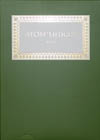 For his first release on Raster-Noton, Atom™ (aka Senor Coconut, Atom Heart, Uwe Schmidt, etc.) has created an album that does not necessarily clash with the label’s aesthetic, but takes a different direction that is much more classical in feel: just as the album’s packaging resembles an old book more than the traditional cold, sterile art R-N are known for, the music within has the same feel, along with input from Kraftwerk’s Florian Schneider.
For his first release on Raster-Noton, Atom™ (aka Senor Coconut, Atom Heart, Uwe Schmidt, etc.) has created an album that does not necessarily clash with the label’s aesthetic, but takes a different direction that is much more classical in feel: just as the album’s packaging resembles an old book more than the traditional cold, sterile art R-N are known for, the music within has the same feel, along with input from Kraftwerk’s Florian Schneider.
Although split across some 20 tracks, the album consists mostly of "suites" of songs that are separated into smaller bite-sized pieces. Bookended by two variations of processed static ("Weisses Rauschen", or "white noise"), the pieces in between combine the usual selection of digitally manipulated sounds, but by way of 1960s early electronic composers, and even a bit of classical musical structures. The four parts of "Wellen und Felder" mix bass pulses and simplistic rhythms and tones, with orchestral like string tones giving the entire piece a classical vibe, even with the sub bass thumps and stuttering electronics.
On "Funksignal" a basic bleep/bloop rhythm and GameBoy snare skitters over cut up fragments of voice and MSP static crunch algorithms. The rhythm never really gets locked in though, and instead scurries about the track, which carires over into "Interferenz 1", which throws the now-overwrought sounds of wireless phone interference that gets boxed into a rhythmic structure, and the occasional piano stab cobbles it all together into some bizarre take on house music.
The series of "Mittlere Composition" tracks vary from violent noise blasts and random electronic noises on the first, to the organ like tones and arpeggiated synths, before ending with fake xylophone ascending/descending rhythms that could be pulled off of some 1970s middle school film strip. The closing cycle of "Weisses Rauschen" tracks puts the emphasis back on the classical elements, with the first piece showing a waltz-like pace and synthetic harp sounds alongside shrill insect calls that eventually adds in another series of GameBoy beats, the evil computer voice at the onset goes from growling to almost singing by the end.
This sinister computer voice is actually that of Kraftwerk's Florian Schneider, which gives the tracks on which he appears a sense of menace, like the all-powerful master computer growling out in clear, yet forceful German. The whole of this album though just doesn’t match its parts. It never feels like it takes off, but seems like a series of musical sketches that are not quite finished. There are good ideas here, but it resembles a collection of tracks more than a fully fleshed out album.
samples:
Read More

